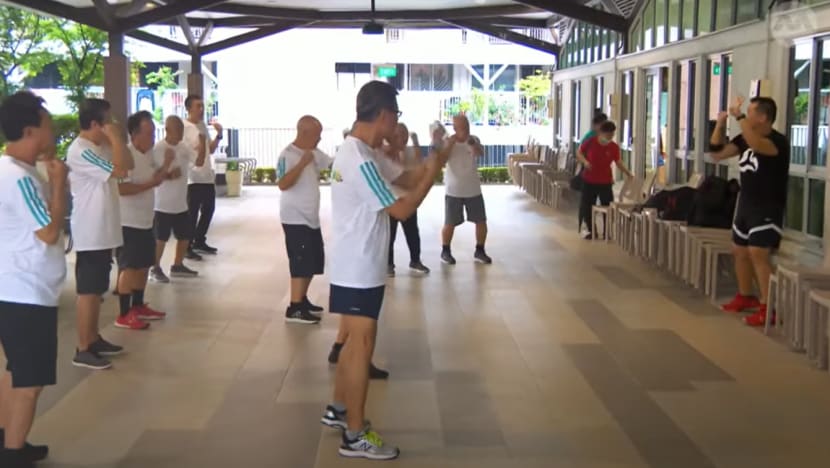Steel combat and pool among new activities at active ageing centres aimed at attracting more men
Currently, males make up just a third of participants at these centres.

Steel combat, which involves martial arts, is among the activities being offered at active ageing centres in hopes of attracting more male seniors.

This audio is generated by an AI tool.
SINGAPORE: "Jab!" "Kick!"
The instructions fly thick and fast, with a group of men in their 50s and 60s getting hot and sweaty as they try to keep pace with the music and the trainer.
They are in a steel combat class - an exercise inspired by martial arts - at an active ageing centre. The class is among the new activities these centres are introducing in efforts to attract more men.
The Agency for Integrated Care (AIC), which coordinates programmes across over 150 active ageing centres in Singapore, is banking on the popularity of competitive or physical sports among men to draw more of them to the centres.
Currently, males make up just a third of participants.
AIC’s Silver Generation Office deputy chief Chew Chun Liang noted that male seniors tend to be introverted, and getting them to step out of their homes to join active ageing programmes is more difficult than getting women to participate.
“We realised that instead of a broad-based programme, we need the programmes to cater to their specific interests and needs. We also realised that male seniors tend to enjoy programmes that are a little bit more competitive,” he said.
STEEL COMBAT, POOL
Centre operator NTUC Health, for instance, recently started offering steel combat as a male-only activity. The number of sign-ups has doubled from February, when the programme first kicked off.
Cluster manager of NTUC Health Active Ageing Centres Vincent Lau said a high proportion of those attending active ageing programmes are females. He said this could partly be because men find that the programmes are catered more towards women.
“We learned from experience that if we open up a programme to both males and females, the females start to book up the slots very quickly,” he said.
He added that male-only experiences can help participants connect with one another better.
"For males, they tend to keep to themselves a bit more. So they do not really tend to share feelings of isolation or social loneliness,” Mr Lau said.
“So, by extending a programme that is just male-only, we find that we are able to encourage more opportunities for males to share experiences, build connections as well and allow them to open up.”
Among the participants in steel combat is 64-year-old Ng Pan Seng, who has become a regular at NTUC Health’s centre in Jurong.
“In an only-men activity, we can talk more freely,” he said.
At one St Luke's ElderCare centre in Sengkang, more male participants are turning up thanks to a new pool club launched six months ago.
"We're definitely seeing 20 to 30 per cent more men joining us in our activities,” said Mr Bernard Wan, assistant director of community-based services at St Luke’s ElderCare.
He said that in typical activities offered at its centres, such as arts and craft, baking classes and health talks, about 80 to 90 per cent of participants are women.
“In addition to our pool club, we currently also have other men-centric activities such as lawn bowling, as well as our 'repair kaki' where men come together to repair appliances. So we intend to increase the number of men-centric activities across our active ageing centres.”
St Luke's Eldercare is also planning an inter-centre pool tournament for more seniors to mingle.
Related:
AIMING FOR AN EQUAL GENDER MIX
AIC helps active ageing centres by working with partners, including national agencies like the Health Promotion Board, Sport Singapore and People’s Association, said AIC’s Mr Chew.
“We're also looking at helping them connect to private organisations that may bring very interesting programmes to the seniors, especially the male seniors. For example, interest groups such as walking football for health,” he said.
The eventual goal is to have an equal gender mix, he added.
Mr Chew said that it is important for the active ageing centres to understand the profiles of their male seniors, as those of different ages would have different interests.
“We are making good progress. We see that the AACs (active ageing centres) are more creative. They understand what the needs of the seniors are and then tweak their programmes. We are seeing an increasing number of male seniors coming to the AACs but there's still a lot of work to be done,” he said.



















